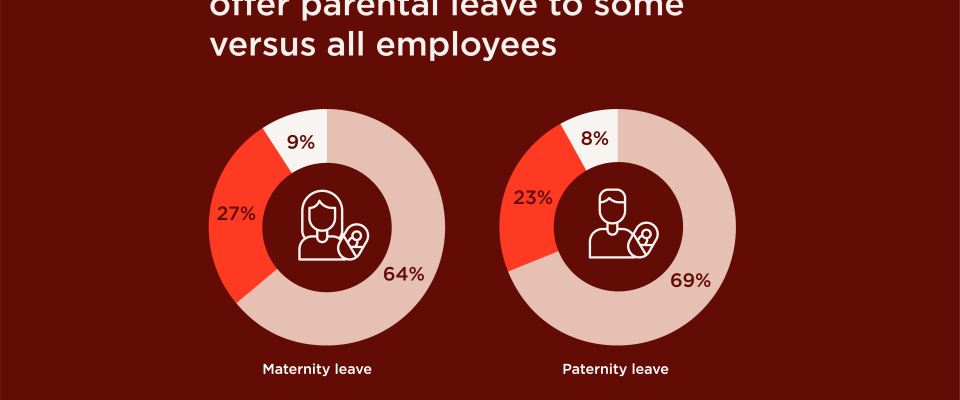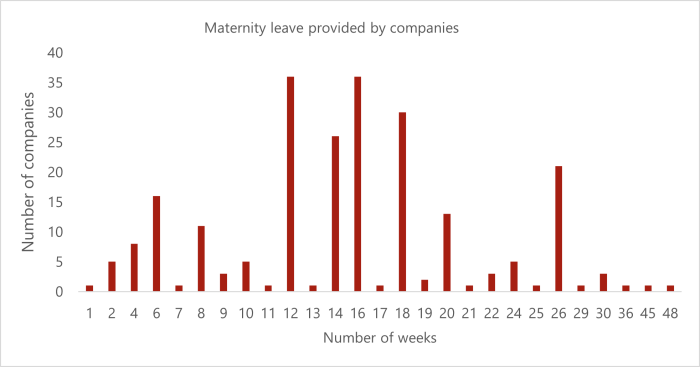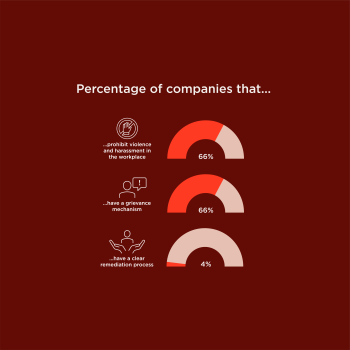Key finding
Companies treat parental leave as benefits offered to some employees, not a right for all

The United Nations and the International Labour Organization (ILO) recognise maternity leave as a fundamental labour right. Paid carer leave allows new parents to bond with their children, supports the physical and emotional recovery of birthing mothers, and encourages fathers to take an active role in caregiving. Despite the gradual adoption of parental leave, government policies vary significantly due to differences in local laws and cultural norms. Companies, therefore, have an opportunity to take the lead in offering parental leave policies to their employees and advance gender equality.
Our assessment reveals that only 36% of the 1,006 companies disclose a maternity leave policy. While the average number of weeks for maternity leave offered by these companies is 15 weeks, the range varies from as little as one week up to 48 weeks. More concerning is that a mere 7% of these companies meet the standard recommended by the ILO, which advises a minimum of 14 weeks of maternity leave. ILO standards also stipulate that women on maternity leave should receive at least two-thirds of their previous earnings and recommend full pay where possible. While most companies with a maternity leave policy indicate that this is paid leave, many are not explicit about the monetary amount.

Carer leave for fathers is also increasingly recognised as a critical component to advance gender equality, though only one in three fathers reside in countries that offer paternity leave. Our assessment reveals that while 31% of companies offer some form of paternity leave, only 8% provide at least 2 weeks as recommended by the ILO. Even fewer companies offer non-biological caregivers these benefits.
Universal parental leave policies could be a means for companies to exert a lasting and profound impact in countries where regulation is inadequate or non-existent. While 120 countries have legislation for at least 14 weeks of maternity leave, there remain 64 countries that fall short of this standard, most of which are in the global south. However, employers are not yet filling this gap. While around 24.5% of companies offer the recommended paid carer leave periods, often these policies do not extend to all areas of operation. Some companies disclose in which countries their carer leave policy is valid, typically following national legislation, though they often exclude certain locations where they operate. Of the 36% of companies that provide maternity leave, only 9% of companies disclose that this policy pertains to all employees globally. Similarly, of the 31% of companies that offer paternity leave, only 8% specify that this benefit is provided to all. This highlights a significant trend where companies tend to relax their benefits for employees further away from their headquarters, rather than making them universally available. In the deep-dive assessment of companies within the apparel and food and agriculture sectors, none of the 112 companies require their suppliers to provide parental leave.
The provision of parental leave is of vital importance as it directly impacts the well-being of families and promotes gender equality. If companies were to provide adequate universal parental leave policies to all primary and secondary caregivers and require their suppliers to do the same, this would improve the lives of many parents and their newborns and help advance gender equality everywhere. Furthermore, parental leave policies can be accompanied by other policies and practices, such as childcare programs, breastfeeding support and flexible transitions for parents returning to work. Policymakers should also enact legislation that mandates paid maternity and paternity leave, backed by a solid framework for funding, ensuring that no one faces financial hardship while taking time off to care for their families. Collaborative efforts from both the private sector and government can help create a more equitable and family-friendly work environment.
The Global Alliance for Care promotes the care society as a new transformative paradigm to promote sustainable development, gender justice, women’s autonomy and the well-being of all persons. In this vision, governments, the private sector, communities and households all carry shared responsibility for guaranteeing the provision of quality, affordable and accessible care and decent working conditions for care workers. For the private sector, achieving this must involve corporate care policies and programmes in the workplaces and value chains, as well as gender-transformative care services that promote co-responsibility.
– Emilienne De León Aulina, Interim Technical Secretary, Global Alliance for Care
